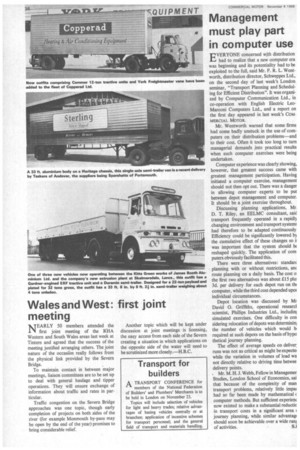Management must play part in computer use
Page 38

If you've noticed an error in this article please click here to report it so we can fix it.
VERYONE concerned with distribution had to realize that a new computer era was beginning and its potentiality had to be
exploited to the full, said Mr. F. R. L. Wentworth, distribution director, Schweppes Ltd., on the second day of last week's London•
seminar, "Transport Planning and Scheduling for Efficient Distribution". It was organi
zed by Computer Communication Ltd., in co-operation with English Electric LeoMarconi Computers Ltd., and a report on the first day appeared in last week's COMMERCIAL MOTOR.
Mr. Wentworth warned that some firms had come badly unstuck in the use of com puters on their distribution problems—and to their cost. Often it took too long to turn managerial demands into practical results when such computer exercises were being undertaken.
Computer experience was clearly showing, however, that greatest success came with greatest management participation. Having initiated a computer exercise, management should not then opt out. There was a danger in allowing computer experts to be put between depot management and computer. It should be a joint exercise throughout.
Discussing planning applications, Mr D. T. Riley, an EELMC consultant, said transport frequently operated in a rapidly changing environment and transport system had therefore to be adapted continuously
Efficiency could be significantly lowered by the cumulative effect of these changes so ii was important that the system should b< reshaped quickly. The application of corn puters obviously facilitated this.
There were three alternatives: standar( planning with or without restrictions, an( route planning on a daily basis. The cost o the first two alternatives was about £15 plul 3d. per delivery for each depot run on tht computer, while the third cost depended upor individual circumstances.
Depot location was discussed by Mr David 0. Griffiths, operational researcl scientist, Phillips Industries Ltd., includim simulated exercises. One difficulty in con sidering relocation of depots was determinin; the number of vehicles which would b required at such depots on the basis of hypo thetical journey planning.
The effect of average speeds on deliver runs was not as critical as might be expecte while the variation in volumes of load wa not directly relative to driving time betwee delivery points.
. Mr. M. H. J. Webb, Fellow in Managemer Studies, London School of Economics, sal that because of the complexity of man transport problems, relatively little impat had so far been made by mathematical ( computer methods. But sufficient experiem now existed to make a substantial reductic in transport costs in a significant area journey planning, while similar advantagg should soon be achievable over a wide ram of activities. S.1








































































































































































